Daimajin Blu-ray Movie
HomeDaimajin Blu-ray Movie 
大魔神Arrow | 1966 | 84 min | Not rated | No Release Date
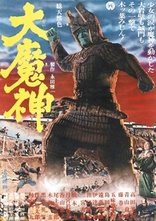
Price
Movie rating
7.3 | / 10 |
Blu-ray rating
| Users | 0.0 | |
| Reviewer | 3.5 | |
| Overall | 3.5 |
Overview
Daimajin (1966)
A giant stone statue comes to life to protect the residents of a small town against the depradations of an evil warlord.
Starring: Miwa Takada, Yoshihiko Aoyama, Jun Fujimaki, Ryūtarō Gomi, Ryuzo ShimadaDirector: Kimiyoshi Yasuda
| Foreign | Uncertain |
| Supernatural | Uncertain |
| Drama | Uncertain |
| Fantasy | Uncertain |
| Action | Uncertain |
Specifications
Video
Video codec: MPEG-4 AVC
Video resolution: 1080p
Aspect ratio: 2.35:1
Original aspect ratio: 2.35:1
Audio
Japanese: LPCM Mono (48kHz, 24-bit)
English: LPCM Mono (48kHz, 24-bit)
Subtitles
English
Discs
Blu-ray Disc
Single disc (1 BD)
Playback
Region A (B, C untested)
Review
Rating summary
| Movie | 3.5 | |
| Video | 4.0 | |
| Audio | 3.5 | |
| Extras | 3.0 | |
| Overall | 3.5 |
Daimajin Blu-ray Movie Review
Reviewed by Jeffrey Kauffman July 29, 2021 Note: This version of this film is available on Blu-ray as part of The Daimajin Trilogy.
Arrow Video's relatively recent release of Django
4K
+ Texas, Adios BD caused me to jokingly ask, "When is a Django film not 'really' a Django film?", and in that regard
I'd
like to take a cue from a reliably ebullient Kim Newman who, in a supplementary introduction to the three Daimajin films collected by
Arrow for this new
release, suggests that this so-called "trilogy" may not in fact be properly termed as such. As several of the supplements spread across this three
disc
set get into, the general flailing of the Japanese film industry and the particular straits Daimajin producing studio Daiei found itself in by
the
mid-sixties meant that when some idea hit with the public, it was played for all it was worth, and in that regard the three Daimajin films
are
probably a salient example, since, as Newman and some of the commentators mention, the three films basically tell the same tale with slight
differences. The third film, called Wrath of Daimajin here, but Daimajin Strikes Again on a previous release on Blu-ray (see
below),
arguably offers the most distinctive ambience due to its emphasis on children, something that (as is again mentioned in some of the supplements)
tends to link that film, at least subliminally, with Daiei's "other" big "monster franchise" of this same period, Gamera. One of the kind of funny things about all three
Daimajin films is that, as commentators Tom Mes and Jasper Sharp discuss in their analysis of the second film, their entire raison d'etre
was ostensibly their special effects, and
yet for the most part all three films offer around one hour of largely effects free narrative before releasing the kraken (so to speak) in the final few
minutes.
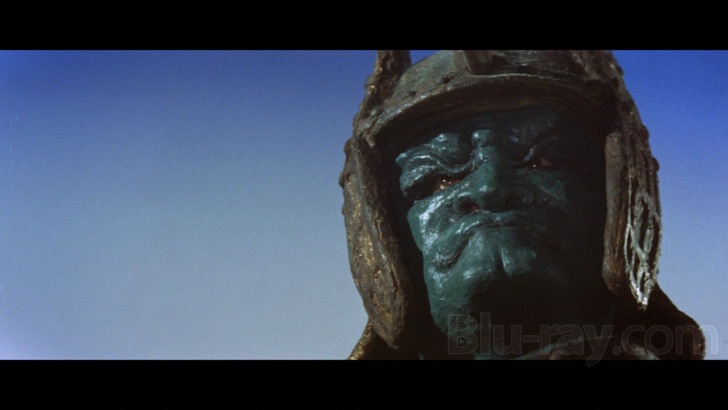
All three Daimajin films were aggregated in a previous release on Blu-ray by Mill Creek Entertainment, and for those wanting plot recaps, I refer you to my colleague Martin Liebman's Daimajin / Return of Daimajin / Daimajin Strikes Again Blu-ray review. Marty's review is also a good resource for those who like to compare screenshots, as well as to see what supplements each version offers. As I've often repeated, "different reviewers means different opinions", and so you will see my scores may vary from Marty's.
Daimajin Blu-ray Movie, Video Quality 
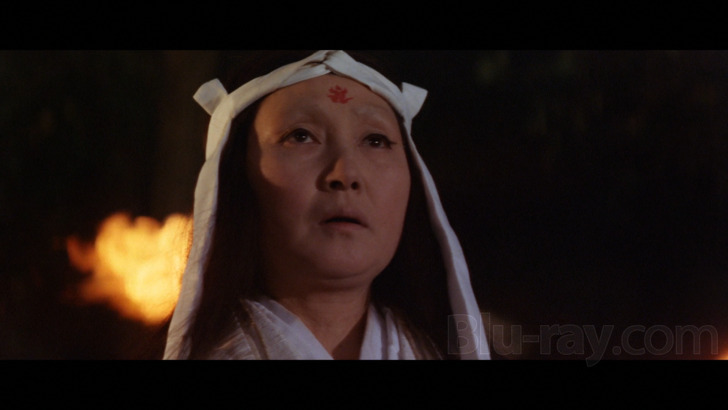
Daimajin is presented on Blu-ray courtesy of Arrow Video with an AVC encoded 1080p transfer in 2.35:1. Arrow's insert booklet contains only the following fairly generic verbiage about this transfer, which is lumped in with the two others in the set:
Daimajin, Return of Daimaijin / Daimajin ikaru and Wrath of Daimajin / Daimajin gyakushu are presented in their original aspect ratio of 2.35:1 with mono sound. The High Definition masters were produced and supplied by Kadokawa, with original grading and restoration by Arrow Films at R3Store Studios.While I don't have the Mill Creek release to do a side by side comparison, a cursory glance through screenshots suggests that this Arrow release offers somewhat darker presentations for all three films, and with a palette that doesn't have the yellow-green look of the Mill Creek release, but which can be skewed more toward a purplish tone at times. This first film offers generally secure detail levels, especially in the many close-ups, and to my eyes clarity looks marginally improved in this version (again judging solely by screenshots). The composite effects show their seams, as is the case in all three films, and the surplus of opticals, especially in the closing third or so of the film, can lead to spikes in grain, though there are no real resolution issues to report. As with its siblings in this set, Daimajin shows occasional slight signs of age related wear and tear.
Additional English language version materials for Majin, the Monster of Terror (Daimajiri) and The Return of the Giant Majin (Return of Daimajin) were sourced from MGM. The picture elements were scanned at Company 3 and audio transfer work was completed at Deluxe Media, Los Angeles. Grading and restoration and audio work was completed at R3Store Studios and The Engine House Media Services.
Daimajin Blu-ray Movie, Audio Quality 
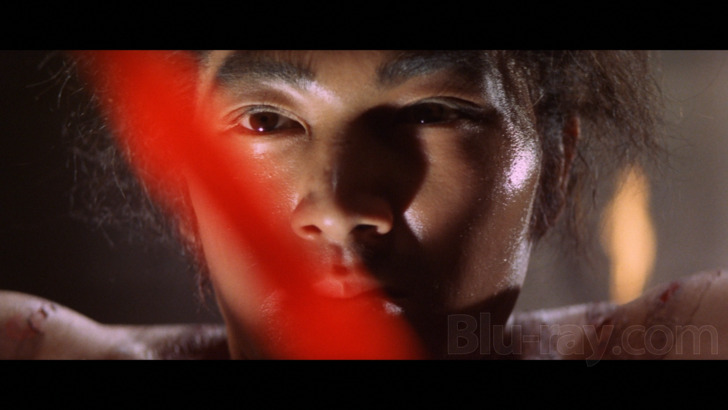
Marty wasn't overly impressed with the audio on the Mill Creek release, and while there admittedly may not be a huge difference in the Arrow version, I'm perhaps a bit more tolerant of some of the issues Marty mentioned in his review, since they're also in evidence on the LPCM Mono Japanese and English audio options on this version. Toggling between these two tracks shows very little if any difference in overall amplitude and mix levels, something that isn't always the case on this set, and I found dialogue to be clearly rendered on both tracks, though the Japanese track did sound somewhat more full bodied to my ears. There is some background damage that can be clearly heard on the Japanese track in particular, which tends to ebb and flow depending on how "quiet" scenes are otherwise. Optional English subtitles are available.
Daimajin Blu-ray Movie, Special Features and Extras 
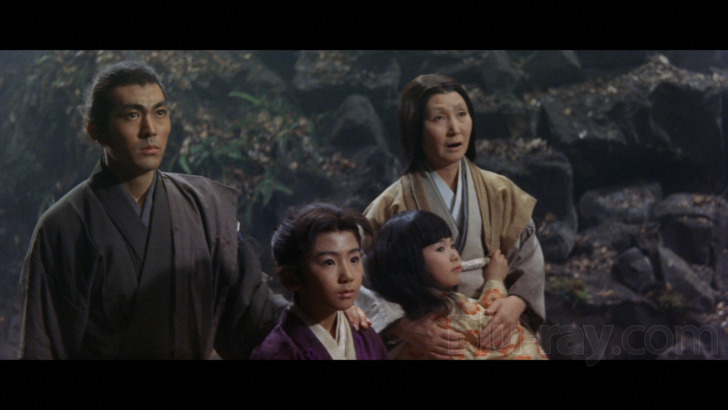
- Audio Commentary by Stuart Galbraith IV
- An Introduction to Daimajin by Kim Newman (HD; 15:23) features the always interesting Newman in an overview of the three films, which Newman avers should probably not be thought of as a traditional "trilogy".
- Bringing the Avenging God to Life (HD; 17:11) is a fun piece with Japanese film historian Ed Godziszewski looking at the special effects the films utilized.
- Alternate Credits are from the US release, which sported the title Majin, The Monster of Terror.
- 2.35 Version (HD; 00:56)
- 1.33 Version (HD; 00:56)
- Trailers
- Original Theatrical Trailer (HD: 2:32)
- Daimajin & Gamera vs. Barugon Double Feature Trailer (HD; 1:14)
- US TV Spot (HD; 1:07)
- Alternate US TV Spot (HD; 1:07)
- Image Gallery (HD)
Daimajin Blu-ray Movie, Overall Score and Recommendation 
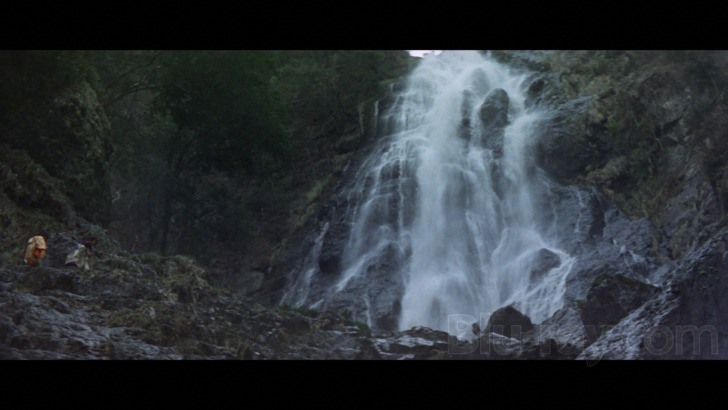
The first Daimajin film offers a secure template from which its two follow ups were obviously culled, and this first film has a certain mystical presence that the two other films arguably don't quite match. Technical merits are generally solid, and the supplementary package very enjoyable. Recommended.
Similar titles
Similar titles you might also like
(Still not reliable for this title)

Return of Daimajin
大魔神怒る / Daimajin ikaru
1966

Wrath of Daimajin
大魔神逆襲 / Daimajin Strikes Again / Daimajin gyakushu
1966

Gamera: Guardian of the Universe
Gamera daikaijū kuchu kessen
1995

Gamera 3: Revenge of Iris
1999

Gamera vs. Barugon
Daikaijū kettō: Gamera tai Barugon
1966

Gamera
Daikaijū Gamera / Gamera, the Giant Monster
1965

Gamera vs. Gyaos
Daikaijū kūchūsen: Gamera tai Gyaosu
1967

Gamera vs. Jiger
Gamera tai Daimaju Jaiga
1970

Gamera 2: Attack of the Legion
Gamera 2: Region shurai
1996

Gamera vs. Guiron
Gamera tai daiakuju Giron
1969

The Great Yokai War
妖怪大戦争 / Yōkai Daisensō
2005

Gamera vs. Viras
Gamera tai uchu kaijū Bairasu / Destroy All Planets
1968

Gamera vs. Zigra
Gamera tai Shinkai kaijū Jigura
1971

Gamera: Super Monster
Uchu kaijū Gamera
1980

Godzilla vs. Biollante
ゴジラvsビオランテ / Gojira vs. Biorante
1989

Mothra vs. Godzilla
モスラ対ゴジラ / Mosura tai Gojira
1964

Godzilla vs. the Smog Monster
ゴジラ対ヘドラ / Gojira tai Hedora / Godzilla vs. Hedorah
1971

The Sword of Doom
大菩薩峠 / Dai-bosatsu tōge
1966

Destroy All Monsters
怪獣総進撃 / Kaijū sōshingeki
1968

Godzilla vs. Megalon
ゴジラ対メガロ / Gojira tai Megaro
1973
